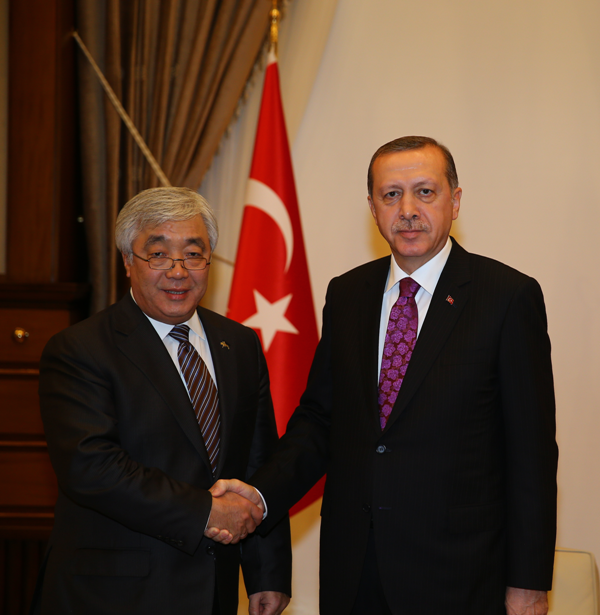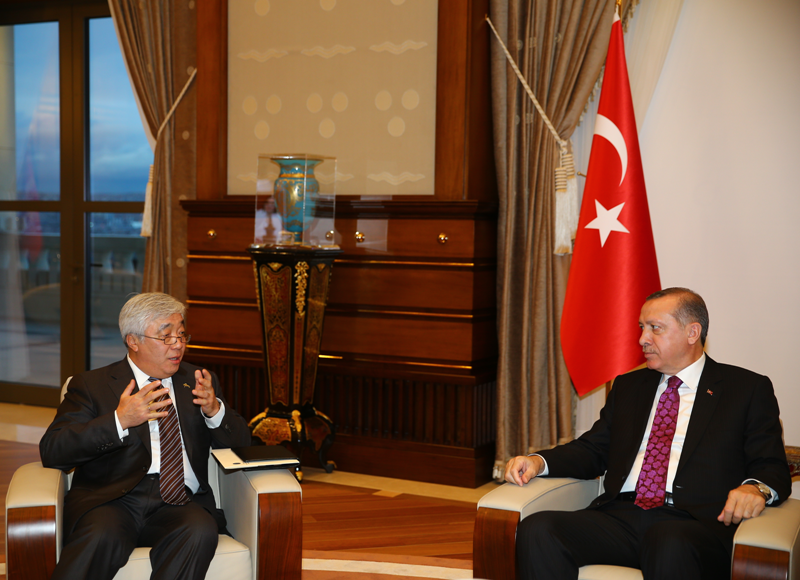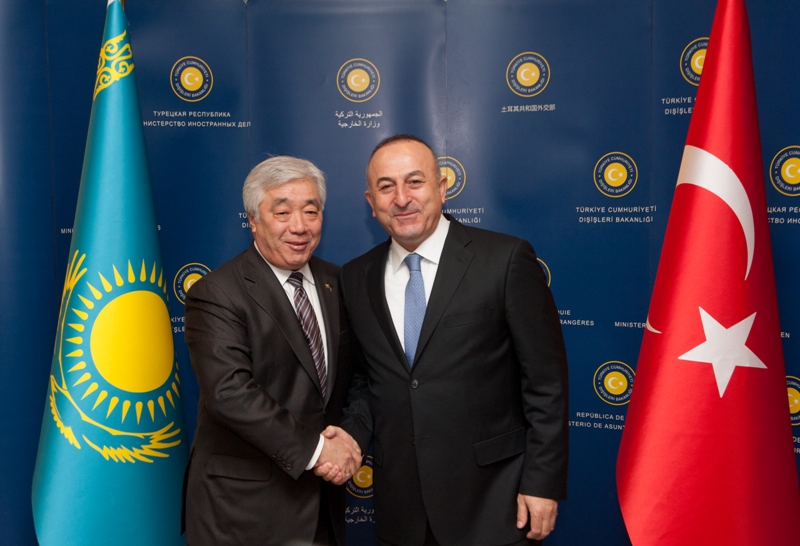ANKARA – Calling their countries strategic partners and brotherly nations, Kazakhstan’s and Turkey’s foreign ministers announced their intentions to further deepen bilateral political and economic ties, including by reaching the mark of $10 billion in annual trade.
 The two foreign ministers, Erlan Idrissov of Kazakhstan and Mevlut Cavusoglu of Turkey, completed the meetings in the framework of what is called Joint Strategic Planning Group (JSPG) in the Turkish capital on Dec. 28-29.
The two foreign ministers, Erlan Idrissov of Kazakhstan and Mevlut Cavusoglu of Turkey, completed the meetings in the framework of what is called Joint Strategic Planning Group (JSPG) in the Turkish capital on Dec. 28-29.
Idrissov paid a visit to Ankara which also saw him being received by President Recep Tayyip Erdogan in the new splendorous presidential residence Ak Saray (Turkish for White Palace).
Speaking to reporters at a joint press conference at the foreign ministry, Idrissov and Cavusoglu also announced that Erdogan would visit Astana in early 2015.
“The date for this visit will be set in the nearest time, and it is expected to take place in February of March next year,” Cavusoglu told the media.
During the meeting with Erdogan, Idrissov discussed the upcoming official visit of the Turkish head of state to Kazakhstan to attend the second meeting of the High-Level Strategic Cooperation Council. Established in 2012, the first meeting of the council was conducted during Kazakh President Nursultan Nazarbayev’s visit to Turkey in October of that year. Another session took place the following April in Almaty.
 Idrissov’s meeting with Cavusoglu included discussions on a wide range of issues about the state and prospects of bilateral and multilateral cooperation. The negotiators expressed deep satisfaction with the pace of cooperation development between Kazakhstan and Turkey, stressing their mutual desire to further strengthen the partnership in bilateral and multilateral formats.
Idrissov’s meeting with Cavusoglu included discussions on a wide range of issues about the state and prospects of bilateral and multilateral cooperation. The negotiators expressed deep satisfaction with the pace of cooperation development between Kazakhstan and Turkey, stressing their mutual desire to further strengthen the partnership in bilateral and multilateral formats.
The JSPG is working on plans to expand a wide range of bilateral issues, including the status and prospects of political dialogue, trade and economic, investment, military-technical and cultural and humanitarian cooperation, inter-parliamentary relations and issues of cooperation in the security sphere.
“Over the past three years, bilateral trade has seen a huge increase; it has more than doubled from $1.9 billion to $4 billion. As you know, President Nazarbayev visited Turkey twice this year with working visits. In June, he participated in the summit of the Turkic Council and in August he participated in the inauguration of the first popularly-elected president of brotherly Turkey, His Excellency Recep Tayyip Erdogan. It is a sign of particularly close and trustful dialogue at the highest level between our two countries,” Idrissov said at the press conference.
According to the Kazakh minister, Astana and Ankara have a full political agenda in a multilateral format including the UN (United Nations), CICA (Conference on Interaction and Confidence-Building Measures in Asia), OSCE (Organization for Security and Cooperation in Europe), ECO (Economic Cooperation Organisation) and OIC (Organisation of Islamic Cooperation). Together with Turkey, Kazakhstan has also played an important role in the foundation of the Cooperation Council of Turkic Speaking Countries (Turkic Council) and the Parliamentary Assembly of Turkic Speaking Countries.
The foreign ministers announced their intentions to continue the dialogue and consistently resolve all issues of bilateral relations based on the principles of brotherhood and strategic partnership.
Ankara’s Support for EXPO 2017, Campaign for UNSC Non-Permanent Seat
 Kazakhstan’s preparation for the international specialised exhibition EXPO 2017 in Astana was also discussed during the talks. The Turkish side expressed its readiness to provide full support in carrying out this event.
Kazakhstan’s preparation for the international specialised exhibition EXPO 2017 in Astana was also discussed during the talks. The Turkish side expressed its readiness to provide full support in carrying out this event.
In addition to bilateral issues, the parties focused on international problems, including the situations in Syria, Afghanistan and Ukraine.
Turkey fully supports Kazakhstan’s candidacy for the United Nations Security Council for 2017-18, Cavusoglu announced at the press conference adding that his country is also ready to offer practical support in the bidding campaign which is set to culminate in 2016. “In case Kazakhstan is elected, we have full confidence that it will contribute to strengthening international peace and security,” said
While in Ankara, Idrissov also met Bekir Bozdag, Turkey’s Minister of Justice, to discuss bilateral cooperation in the legal sphere and in fighting terrorism.
Strong Ties Going Back Decades and Centuries
Turkey was the first country to recognise Kazakh independence on Dec. 16, 1991. The Turkish Embassy in Almaty was opened in March 1992 and later moved to Astana.
Today, Turkey is one of the most advanced and fastest-growing, highly-industrialised economies in the Middle East and Eurasian region. The country plays a leading role in the Kazakh construction industry.
In turn, Kazakhstan is one of Turkey’s most important political and economic partners in Central Asia. The frequency of high-level bilateral visits reflects the level of relations between the nations and provides a platform to exchange views on bilateral, regional and international issues. Erdogan’s visit to Kazakhstan in 2012, then as prime minister, helped expand areas of cooperation between the two countries.
When Idrissov summarised the outcomes of Kazakhstan’s foreign policy for 2014 during a major press conference Dec. 26 in Astana, he noted that Kazakhstan attaches great importance to strengthening comprehensive cooperation with the Republic of Turkey, which is based on the common historical roots and cultural values of the two nations.
EEU-Turkey Free Trade Area to Be Worked on
According to the Kazakh foreign minister, the creation of the Eurasian Economic Union (EEU) should be beneficial not only for its member states, but also for their partners.
“Our policy is that the EEU is of the open nature, open for economic partnerships,” Idrissov told the assembled Kazakh, Turkish and international media. “We are initiating free trade arrangement between EEU and Turkey. Turkey is an important economic partner for Kazakhstan, Russia and Belarus bilaterally, and it is important to have a general agreement on a free trade zone with Turkey.”
He added that similar trade facilitating arrangements are being sought between the EEU, which enters into force on Jan. 1, 2015 and which creates a common market of up to 200 million people, and countries such as Vietnam.


